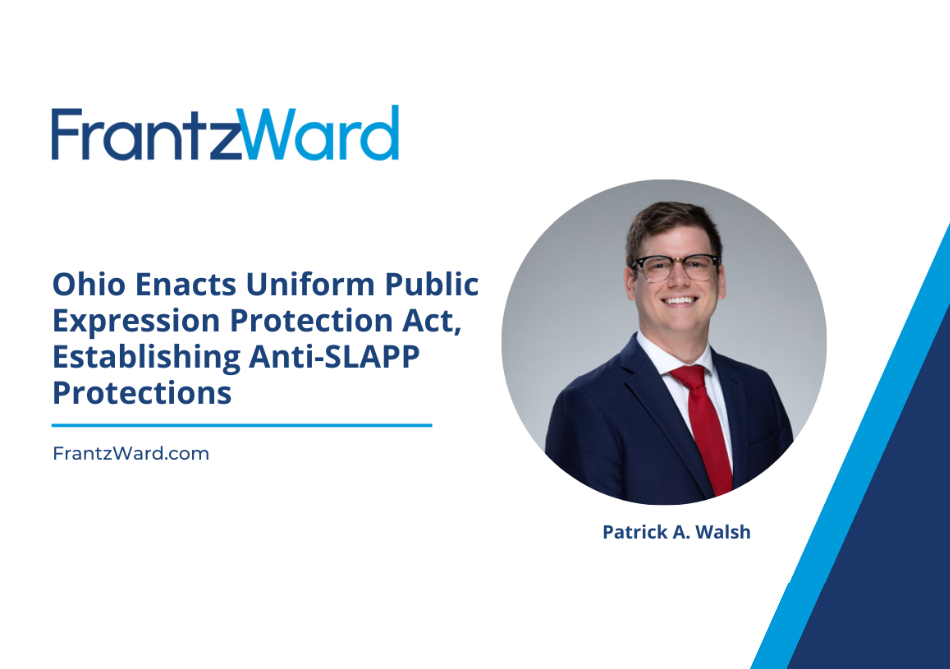Ohio Enacts Uniform Public Expression Protection Act, Establishing Anti-SLAPP Protections
On January 8, 2025, Governor Mike DeWine signed Senate Bill 237 into law, making Ohio the 35th State to enact anti-SLAPP protections. The bill codifies the Uniform Public Expression Protection Act (“UPEPA”) (R.C. 2747.01 et seq.), providing protections against Strategic Lawsuits Against Public Participation (“SLAPP”). These lawsuits, often pled as defamation claims, are intended to punish individuals for exercising their free speech rights by entangling them in costly legal battles.
When the UPEPA Applies
UPEPA provides substantive immunity from suit for certain categories of communications made by an individual, estate, trust, partnership, business or nonprofit entity, governmental unit, or other legal entity in the following contexts:
- Statements made in a legislative, executive, judicial, administrative, or other governmental proceeding.
- Comments on an issue under consideration or review in governmental proceedings.
- Exercise of free speech, press, assembly, petition, and association rights, guaranteed under either the U.S. or the Ohio Constitution, on a matter of public concern.
When the UPEPA Does Not Apply
UPEPA also enumerates certain categories of lawsuits where the statute does not apply, including:
- Legal action taken against a governmental unit or an employee or agent of a governmental unit who was acting, or purporting to act, in an official capacity.
- Enforcement action brought by a governmental unit to protect against an imminent threat to public health or safety.
- Legal action taken against a person primarily engaged in the business of selling or leasing goods or services, if the lawsuit arises out of communication related to the person’s sale or lease of those goods or services.
- A survivorship claim or a lawsuit seeking recovery for bodily injury or wrongful death, or statements made regarding that claim or lawsuit.
The Motion for Expedited Relief to Dismiss the Civil Action
UPEPA allows defendants to file a motion for expedited relief to dismiss SLAPP lawsuits within 60 days of being served. Once the motion is filed, all further court proceedings are stayed pending resolution of the motion, with limited exceptions.
To succeed on the motion, the moving party needs to make a showing of the following:
- The causes of action fall under one of the UPEPA’s protected categories
- The responding party fails to show that the UPEPA does not apply
- (1)The responding party fails to establish a prima-facie case for each element of the cause of action OR (2) the moving party shows either:
- (i) that the responding party failed to state a claim for which relief may be granted, or
- (ii) that there are no genuine issues of material fact, and the moving party is entitled to relief as a matter of law on the relevant claims.
To support its motion, the moving party may rely on the pleadings, briefs filed in support or opposition, and any evidence permissible in a motion for summary judgment.
The court must hold a hearing within 60 days, unless limited discovery is permitted, and issue a ruling within 60 days of the hearing.
Additionally, UPEPA directs Ohio courts to consider case law from states with “substantially similar law” to “promote uniformity.” R.C. 2747.06(C). While Ohio has just enacted UPEPA, Ohio courts will not be starting from ground zero in interpreting and applying it.
Relief
If the court grants a motion, in addition to dismissing the relevant claims, it must also award reasonable attorneys’ fees, court costs, and other reasonable litigation costs. However, if a court denies a motion and finds that it was frivolous, the court must award reasonable attorneys’ fees and costs associated with defending against the motion.
Implications
Before UPEPA, Ohio had limited protections against SLAPP lawsuits. Now, the state joins the majority of states providing defendants with swift, cost-effective protections while deterring the filing of meritless suits.
If you have any questions about the provisions of this law, please contact Patrick A. Walsh or any member of the Frantz Ward Litigation practice group.


